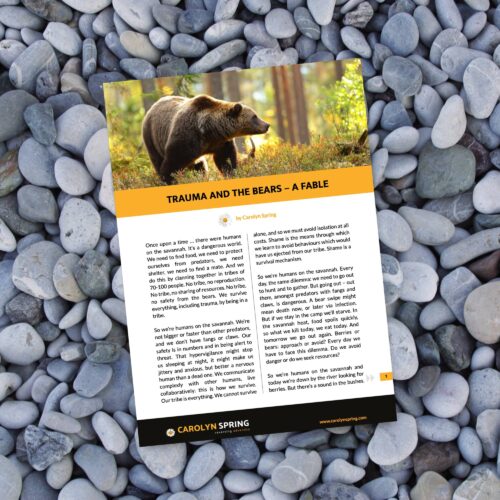How can we talk about trauma in a way that explains it in metaphors and narrative? How can we explain the dynamics of trauma without being triggered by them, or getting stuck in the detail, of having to describe our particular circumstances?
They were the questions I was trying to answer when I wrote this article. I wanted to explain the evolutionary neurobiology of trauma without being overly complex. I wanted to develop a vocabulary and language.
Is there a simpler way of talking about and explaining trauma that doesn’t victim-blame? One that’s based on our evolutionary heritage as human beings? One that looks not just at what happens during trauma, but also what need to happen afterwards so that we recover? What about a fable?
I’ve talked about the metaphor of the bears (and the berries!) elsewhere – specifically in my recent Podcast #16 ‘Trauma needs a solution’ and also in Webinar #1 ‘Working with trauma in a time of trauma’ but I’ve never properly written it down. Until now! There was so much more that I wanted to say … but I’ve hopefully covered the key concepts.
Why? Firstly because I’m hoping that it will help reduce shame for trauma survivors as they realise that:
- it’s not just them, and
- their responses are entirely natural, and as humans we’ve been responding the same way for millennia. We were mauled by bears because that’s what bears do – it wasn’t our fault.
Secondly, because I hope it’s a really useful way of being able to talk about trauma without it being overly triggering. When we can step back and talk about the ‘bears’ rather than naming and bringing to mind specific perpetrators or events, it gives us a little bit of mental and emotional breathing space to be able to think more clearly about what happened, and understand some of the dynamics involved in trauma.
And thirdly, because I don’t believe the onus for healing is just on us as individual survivors. After trauma we’re supposed to be able to return to a safe tribe. And so this article poses the question of the role of the tribe in our recovery journey.
